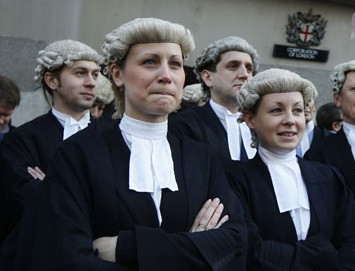Barrister

Historically Barristers were the specialised lawyers who would accompany a judge around the country and represent clients in court. Solicitors tended to be far more local. Interestingly as well, being a Barrister had a strong social aspect, as the Barristers and Judges tended to have a good relationship and this carries on into the training and organisation of Barristers today.
Here are the required steps for becoming a barrister:
University
Many students will do a course in a related subject, such as History before converting. However it is important to remember that this is very expensive and many are put off by the additional year and hard work.
A Law course or LLB typically involves students studying a number of core subjects such as Criminal Law, Tort, English Legal System and Equity before then being allowed to choose some more specialised areas, Medical or Discrimination for example. Importantly at this stage what you learn is largely academic, you will have a chance to get quite involved in debating societies and find work experience in the holidays but this is not compulsory if you do not want to actually study law further.
Law School
As a minimum you need a 2:2 or in some cases a 2:1 to get into a Law School. It is expensive and very competitive because of an oversubscription of lawyers at the moment. There are about a dozen law schools over the UK and they teach the actual workings of the job. For a barrister this is the BPTC, solicitors study the LPC.
On the BPTC you will be taught advocacy, writing proofs and advice and will have much more of a chance to start specialising. The 12 formal dinners at the Inns of Court can be substituted for training days, but the idea is to network and get to know other Barristers, especially when looking for pupillage.
Pupillage
Despite the competition so far it gets even harder to find pupillage and as most do it in London the costs of living are incredibly high. Although you can start working independently in the second half it is unlikely you will find many well paying clients as your reputation is not yet established.
Organisation
- Barristers will belong to an Inn of Court and regularly attend many social and professional events there. The key to any successful career here is networking and particularly those wanting to be judges will need to have people who can vouch for their ability.
- A Barrister will also work in a chambers along with other Barristers. Mostly, the actual work tends to be their own but they will share the services of a clerk. The clerk tends to bring in most of the business for a Barrister so they are crucial.
- Barristers will refer to one another as ‘my learned friend’ in court and solicitors just as ‘my friend’, this is a traditional form of address which, like the outfit, is often seen as slightly outdated.
- Barristers may also work for the CPS (Criminal Prosecution Service) or GLS (Government Legal Services).
Regulation
- Barristers are regulated by the Bar Standards Board (BSB), this has been since 2006 as before they were regulated far more by the Inns and the General Bar Council.
- The aim of the BSB is to regulate the Bar so as to promote high standards of practice and safeguard clients and the public interest.
- Since Arthur J.S Hall and Co. v Simons (2000) 3 AER 673 Barristers can be sued for malpractice. Until then the courts were against it as they worried that there would be a torrent of claimants suing just because they lost and were unhappy. However compared to other professions, such as medicine, this doesn’t happen. Therefore Barristers can be sued if it is shown loss has been suffered as a result of their negligence.
- Barristers also follow the Bar Code of Conduct which implements rules such as the Cab Rank Rule.
Work
- Barristers provide specialist legal advice and represent their clients in courts and tribunals. The work is intellectually challenging in an intense and demanding professional environment. It is also a very rewarding career. Barristers’ work varies considerably depending on the area of law they practise in, and their seniority.
- Typically, barristers do some or all of the following:
- Advising clients on the law and the strength of their legal case. This often requires considerable amounts of legal research, followed by writing an ‘Opinion’ for your client setting out your advice.
- Holding ‘conferences’ with clients to discuss their case and give them legal advice.
- Representing clients in court. This can include presenting the case, cross-examining witnesses, summing up all relevant material and giving reasons why the court should support your case.
- Negotiating settlements with the other side.
Most barristers are self-employed and work in chambers, although approximately 20 percent are “employed barristers” and work for an employer in industry, commerce or central or local government. This is known as the 'Employed Bar'. The role of the employed barrister can vary greatly depending on the employer. The majority will work in specialist legal departments advising only the organisation they work for. Self-employed barristers work in offices called chambers which they may share with other barristers. On completion of their training, barristers apply for tenancy in a set of chambers.
